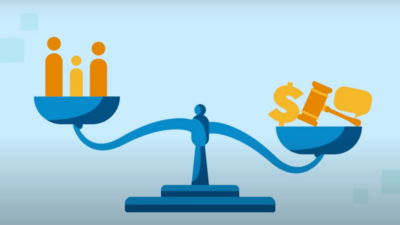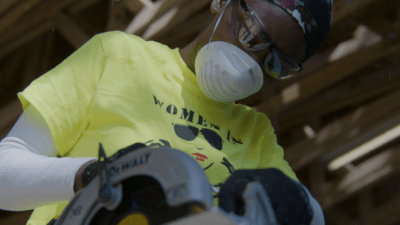Kay Matthews says women should not suffer in silence.
As founder and executive director of The Shades of Blue Project, she seeks to change the way women of color are diagnosed and treated after giving birth and experiencing adverse mental health outcomes by breaking cultural barriers in maternal mental health.
The Shades of Blue Project is sponsored by Matthews’ Houston-based nonprofit, BabyCakes and Brunch, offering programs and services in 35 states across the U.S.
Matthews first launched Shades of Blue Project in 2013, shortly after the stillborn death of her daughter. Author of the self-help journal, “365 Days to Recovery: Finding Your Way Out of the Darkness,” she has worked on and supported key federal legislative efforts to help improve maternal health outcomes and experiences, providing a unique perspective that emphasizes racial equity.
Through the W.K. Kellogg Foundation social impact bond, BabyCakes and Brunch received a $499,000 capacity-building grant to increase access to culturally congruent maternal mental health support services for Black and Brown women through The Shades of Blue Project.
Matthews reflected on her personal journey, the growth of her organization and the future of maternal mental health:
Question: Kay, let’s start with your story. What is the genesis of The Shades of Blue Project?
Kay Matthews: This work chose me; I did not choose it.
I came into it from my own adverse outcome in childbirth. I delivered my daughter stillborn. And a decade ago, the correlation between infant loss and postpartum depression, or anything around maternal mental health, just wasn’t being made.
So typically, you lose a child, and they tell you, ‘It’s grief,’ and life kind of moves forward. But that’s not what actually happened to me. And what I struggled with was finding someone that I could at least see a glimpse of myself in. I had to really fight for myself.
It was almost a year before someone would listen to me. And it just happened to be my general practitioner when I went for my wellbeing checkup. I’m telling him all the ways I’m feeling all these different things. And being that he has taken care of me for many, many years, he was like, ‘Well, it’s postpartum depression… But it’s getting worse. Let me see what I can do to get you some help.’ And I got to exhale.
I started journaling as my own form of therapy. And it was like my ‘aha’ moment of what was happening around me. And that became the key to my own recovery. And that was the piece I started to share with folks is how to just simply, literally take one day at a time.
I created The Shades of Blue Project from my own experience. I am a resource provider and a connector. I don’t claim to know all the things and all the ways, but I know somebody who does. So, you build out this network.
Question: Why is it important for women – before and after childbirth – to make connections and be open to sharing their feelings and experiences?
Matthews: We have to know that we have somebody there who can help us to navigate what this thing is, because this is new. You can have five children and each birthing experience could be different. But then people will look at you and be like, ‘Well, you already got four other children, why is this so hard?’
When something weird happens that we’re not used to, we tend to reject it. We’ve embedded a lot of those things into the way that we serve, because it’s about filling in these gaps that exist right now.
We know that these things are going to happen, somebody’s going to fall through the cracks. How are we at the bottom catching them, so it doesn’t feel that way and they still get what they need, and they’re able to navigate through it? It’s about really being intentional about everything that we do and how we do it. If it were you sitting across that desk, how would you want to be talked to? How would you want to be treated?
Question: Centers for Disease Control and Prevention research shows about one in 8 women with a recent live birth experience symptoms of postpartum depression, with American Indian and Black women experiencing the highest prevalence. Why do we see gaps in diagnosing and the treatment of postpartum depression among racial and ethnic groups?
Matthews: Historically, the healthcare system was not very inclusive of Black people. We are expecting a system to perform for us that was not ever designed for us.
This is a systemic issue that will not be resolved overnight, but it will be resolved with a collective effort. And understanding and knowing the role that we all play, and that there’s no one person who has the magic to make this all go away.
We know the issue. What we’re not doing enough of is uplifting the solutions. There are tons of solutions. Even within these systems that are typically overlooked. There are tons of solutions within our communities that are often overlooked. It’s really about us pulling together and understanding that we all have our respective place and a role to play.
Question: During the pandemic, nonprofit organizations around the globe had to continually adapt to meet both immediate and long-term challenges. How did your organization respond?
Matthews: 2020 was a weird year, right? It was also, honestly, one of the best things that could have happened to us. I had to get comfortable with being okay with saying that. I know that it was rough and that wasn’t the experience for everybody. What 2020 allowed us to do was to get in position for the growth that we were working for. We were already ready to roll.
What the pandemic did was for us, it was like the world had hit a restart button. And folks who are not ready to slip over into the digital world, they kind of fell back. And then I felt like we were lifted. The growth continued, where folks were talking enough about us to where funders became interested in us.
The money that we got from the Kellogg Foundation really was for that capacity building. By the end of 2020, I could come out of my house and work towards opening up our Maternal Mental Health Resource Center, which is currently active, as well as hiring some of my volunteers that have been with us from the beginning, making them part of our staff.
For us, it was the stepping-stone that we needed to be able to impact and interact more with the folks that we were already reaching but had been limited by funds. It gave us growth and more relevance to the work.
Question: What is next for The Shades of Blue Project?
Matthews: We’ve created the National I.N.S.P.I.R.E. Collaborative for Maternal Mental Health Disparities. (I.N.S.P.I.R.E. is an acronym for Involve others, Nourishment/exercise, Spirituality/prayer, Patience, Identify and initiate change, Rest/relaxation, and Each day is a new day). This will allow us to tie in the infant mental health, Prenatal to 3-year-old (PN-3) policy perspective from a collective standpoint, and I will be working with other leaders and grassroots organizations as a part of my advisory team on these issues. So, we will be demonstrating what this collective effort looks like, in hopes that others will continue to see value in being connected.
Some people just need help. And if we don’t help them in their time of need, then that short-term thing turns into a long-term thing that could have been fixed… Let’s do what we know is working. We have the ability to have better numbers, the first year postpartum. We really honestly have the ability to do these things, but it’s going to take us doing it together.
Read More: ABC13 Houston TV segment on Shades of Blue
Endnote
If you need immediate help, or you feel you may harm yourself or your baby, please dial 911 or your local emergency number; National Maternal Mental Health Hotline 833-TLC-MAMA (833-852-6262); or the 24/7 National Suicide Prevention Lifeline 1-800-273-8255.








Comments